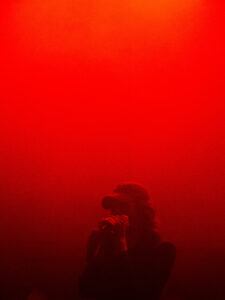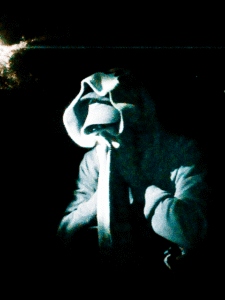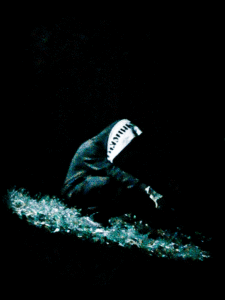Among all the darkwave artists that have emerged in recent years, Sad Madona stands out for a sound that looks more to the future than to the past. We have followed his incredible evolution through two albums that compile his singles, the first released by the renowned label Oráculo two years ago. In Dramatic Dance, we could find his early tracks, already showcasing a very personal touch. This year, we’ve been able to listen to the continuation, released by Manic Depression, titled Amor Hardcore, which we can say is one of the best collections of songs we’ve heard in 2025. We spoke with Rémi Lauvergne, the young musician known as Sad Madona, who we is playing live for the first time in Spain during the Ombra festival.
 —Why did you choose a name like Sad Madona for your project?
—Why did you choose a name like Sad Madona for your project?
—I wanted something that soundstod instantly classic and is beautiful to spell. It’s important and difficult to find a name, and it took me a year to get a good inspiration. One evening, I was surfing on a community YouTube page sharing Russian post-punk, and all the covers featured crying madonnas. That’s how I found the name for the project. I know many people spell Madona with two n’s. Despite the mistake, I also like the idea of the fallen pop star. I think it fits my music well.
—Were you in any other band before starting Sad Madona? The music of your project sounds very mature (in a good way) for first compositions.
—No, I had no musical experience before starting about six years ago. I never had a band, I don’t even know how to play an instrument or read music. I just learned to compose on FL Studio by analyzing my favorite songs or by listening carefully to all musical styles, from pop to black metal. I’m still learning, although I think I have a good level of composition now. It’s hard, in my opinion, to play and create with others because I’m terrible at art: I like to control everything and for it to be exactly how I hear it.
—What urged you to start making music?
—The desire, simply. I was at university, quite unhappy and bored with my life. I listened to a lot of music and thought: why not try to make some myself and create something beautiful? I downloaded FL Studio, and every time I opened the software, time flew by. Even though I was very bad at first, I was happy to listen to my first sounds and especially determined to work on my ear, motivated by the idea of composing a beautiful song.
—Being French, are you interested in the coldwave bands from the 80s? We saw Little Nemo at Ombra festival a few years ago and they played a really good concert.
—I have no French coldwave references, except for Hante and Minuit Machine. Unfortunately, I don’t listen to French music from the 80s, or even 80s music in general.
—In a more general way, which French artists have influenced you, both musically and lyrically?
—Absolutely none. I am very inspired by American music, whether it’s the lyrics, production, or vocal treatment. I write in French and sing in French, but I don’t feel like I sound like one. To be honest, French goth music bothers me a bit: I find the vocals too prominent and the productions too dry. It gives a somewhat intellectual and falsely punk vibe that repels me.
—There are only two months of difference between “Cemetery”, your first track, and “Spirit of Ecstasy”, the second one, but the evolution is really amazing. Do you think that you found your sound in that period?
—Indeed, it was during that period, fall 2021, that I found my sound. “Cemetery” is a good catchy and nostalgic song, but I really figured out how to use my voice on “Spirit of Ecstasy.” The latter is by far my most beautiful song, and I don’t think I can make another one like it. It was the first song that received real feedback, maybe 100 views in a week on YouTube (lol). I thought: okay, I need to keep going in this direction.
—In “Idole,” you collaborated with Mega Sega Drive Club. How was this collaboration born? Do you like working with other musicians?
—I found Mega Sega Drive Club randomly on the internet. At the same time, I had composed “Idole”, but I wasn’t 100% satisfied with my work and didn’t think I would release it. Not knowing what to do with it, I decided to send it to him without expecting anything. In the end, he added some crazy synthesizers to the chorus, and especially a really cool vibe to the mix. It sounded much better, so we decided to release it. I love this song; it’s pure EBM/darkwave, straightforward but effective.
—The electronic/dancey part of your music sounds very modern, for example in “Witch Coast”. What kind of electronic dance music do you prefer? Do you follow witchhouse?
—Yes, it’s very important to stay up to date and sound modern. There are so many good artists renewing electronic music and making it trendy: Snow Strippers, Suzy Sheers, Anna Luna, or Elusin. I’ve always been into witch house; it’s so pure, so emotional and haunting. My upcoming compositions will mix a lot of elements from eurodance/witch house/shoegaze and darkwave. I also feel that the audience increasingly sees me as an artist halfway between witch house and goth, and that’s great because that’s what I want to become and what I will become.
—You label your style “dramatic dance,” as the name of your EP for Oráculo. How would you describe your style?
—It’s just a fun term I used to name the vibe of my music. It’s sad music you can dance to. Maybe in a few years, when I retire, I’ll open a label under that name and work with young artists. But my career hasn’t started yet, so that’s far ahead of me.
—Do you consider yourself a melancholic person?
—It depends on the periods, but yes.
—In songs like “Chloroform” or “Rebellion”, the influence of shoegaze is clear. Now there are a lot of people interested in this style of music, how did you get into it?
—I’ve always listened to shoegaze: Life on Venus, Trauma Ray, Slowdive. I’m not surprised by the current hype for this style. I still think that shoegaze on TikTok is aseptic, even if it remains cool. I’m a fan of shoegaze, but I mostly listen to depressive black metal: it’s one of the saddest and most emotional genres out there right now. I would recommend anyone to listen to the artist Sadness.
—Now that you are talking about black metal, I would like to ask you about the instrumental “New Flesh”, a song in a more blackgaze direction. Are you interested in bands like Alcest? Is this something you would like to follow, or are you interested in more danceable material?
—Alcest is a great band, yes! Their work is incredible. I will obviously include this type of music in my sound. It’s already happening, but I’d like to bring something more modern to it, with synths or electronic bass/rhythms. I think I’ve already attempted that with “Chloroform” and “Rebellion”.
—Did you plan Amor Hardcore as an album, or is it just a collection of your singles?
—Amor Hardcore is a collection of singles with an unreleased song that gives the project its title. I didn’t plan to make an album, but it’s still a nice showcase of my work and marks these years of musical creation. Now, I need new material, and it’s coming.
 —I really like your song “L’hiver dans le corps”, which sadly was not included in the album. Would you like to do more songs in that style?
—I really like your song “L’hiver dans le corps”, which sadly was not included in the album. Would you like to do more songs in that style?
—Yes, it’s one of my favorites too. I have a song in that style on the project; it’s called “Amor Hardcore”. And I will obviously compose more like that. I was inspired by Bladee, Yung Lean, or Teen Suicide. I love lo-fi, ghostly, and desperate piano songs. “L’hiver dans le corps” is one of my only songs with a specific theme about death. Here, it doesn’t go in all directions, and the lyrics simply describe the loss of a loved one.
—Why do you think that dark music is appealing to young people again?
—Maybe thanks to the internet and TikTok, as the genre has exploded in recent years. But overall, I think we are becoming increasingly tired of the world we’re living in. Relationships, work, the future… everything becomes very anxiety-inducing after twenty. I don’t know if dark music speaks to everyone in the same way, but obviously, hearing a melody that sounds like what’s in your heart can resonate with you.
—Your songs are about lost love, mortality; are they mostly about things that happened to you?
—I don’t think I’m that pathetic in life outside of music. These are obviously feelings and situations that cross my mind or have crossed it, but I phrase them in a way that sounds good because musicality comes before the message. I don’t write with a specific theme in mind; however, some lines are directly linked to what I’ve experienced, said, or thought one day. My goal is still to make the lyrics speak to everyone.
—Although you confessed not to listen to music from the 80s, there is a strong influence of the sound of this decade in your music. Where do you think this influence is coming from?
—Unfortunately, I don’t listen to music from the 80s. In truth, I think I’m inspired by modern darkwave artists, who are themselves inspired by artists from the 80s. So unknowingly, I’m using compositional codes from that era, indirectly.
—As we commented, the first of your songs appeared in an EP by the Spanish label Oráculo. That’s how I learned about you. Do you like other artists from the label?
—Oráculo is a great team! They offered me to do a vinyl when I only had 5 or 6 existing songs. They were really there from the beginning! To be honest, I don’t know much about their roster. Generally, I’m not too interested in labels, but I really like connecting and creating things with passionate people, which I think is the case with Oráculo.
—You collaborated on the last album of Blind Delon. What can you tell us about this collaboration?
—In June 2024, I opened for Blind Delon in Switzerland. I was already listening to them before, and it was really a pleasure to meet them. A few months later, they asked me to help them compose or appear on their project. I said yes immediately. They sent me quite a few productions, and I chose one that inspired me to sing on. The final version is different from what I initially sent, but in the end, it works, and it’s cool to have my name on a French project. There are few artists in this genre in France, so we really need to support each other.
—Techno legend Ellen Allien remixed your song “Witch Coast”. How did you feel having such a big name remaking one of your tracks? How did she contact you for the remix?
—It’s quite incredible. Ellen is a legend and especially a lovely person. She contacted me a year ago and gave me a lot of encouragement through messages; we wanted to do something together! When I released “Witch Coast”, which had a nice electro sound, I thought it was the right time to send it to her. I proposed if she was okay with doing a remix! I really like her work, and she made the sound much more club-oriented. I still felt like an impostor for a while because it seemed crazy to me that such a legend validated my music and wanted to collaborate with me. On the other hand, it gave me confidence, and I told myself that I was finally credible as an electronic artist.
—The other remix was done by Skelesys, one of the most interesting artists in the darkwave field. Do you like his music? Do you see yourself as part of the same scene with him or bands such as Drab Majesty?
—Skelesys is really strong too! It was Oráculo that connected us; the label wanted an additional song to include on the record. I sent the tracks to Skelesys, and he did the remix in less than 24 hours, so that’s quite impressive. I like his music; I think he sounds more in the vibe of Curses and has a more EBM touch. Yes, we belong to the same universe, but I think his music is inspired more by older bands, so the energy is different from mine.
—What is Sad Madona going to bring us in the future?
—I really want to create something that represents me 100%, even if it will drift a bit from classic darkwave. I have new and very beautiful songs in stock; I’ve put my heart into them, and I can’t wait to release all of that and play them live.
—What can we expect from your live performance at Ombra?
—A moment of emotion.

